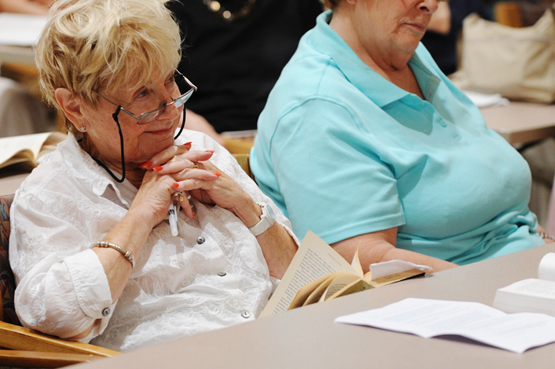Evergreen Students Receive, and Give, an Education
Auditing program open to those age 58 and up

It’s not hard to pick out the Evergreen students in the average undergraduate class — the program, which allows local residents to audit Boston University classes, is open only to those age 58 and up. It’s not difficult to understand the Evergreen Program’s appeal, either: students can participate in any class offered at the University, with the instructor’s permission, and pay just $75. But they aren’t the only ones who benefit. Jonathan Ribner, a College of Arts and Sciences associate professor of art history, says that Evergreen students offer a unique perspective in the classroom and a different cultural context for both students and faculty. He spoke with BU Today about his experience with the Evergreen Program.
BU Today: How does teaching Evergreen students affect your classroom experience?
Ribner: It’s a really great opportunity for our students. They get to see, for one thing, what learning is really about: it’s not just about grades — it’s really about wanting to know about things. It brings a different kind of perspective on learning that I think is really important — especially now, because there’s so much pressure in the high schools for students to get into the best colleges and achieve and do all the AP courses that they really come in thinking so much about grades. I think having Evergreens in the class shows that there’s something else.
It’s also nice for students to see a positive image of older people, because in our society there’s so much emphasis on youth and on how when you’re older you’re less physically able. What they’re not really aware of, and what they can sometimes get a sense of from the Evergreen students, is that you grow wiser, and your happiness and interest in the world, if anything, can increase.
What do Evergreen students bring to your courses in art history?
These are people who have lived through a lot more time. If you’re teaching something like contemporary art, which starts in 1945, it’s good for the students who were born in the late 1980s to have someone in the class who lived through the 1940s. Especially if we’re talking about something like the Korean War or the Vietnam War, these students don’t really have much sense of what that was like at all.
Have you found a learning gap, particularly where new technology is concerned?
Just this week, an Evergreen student gave a seminar report. Nowadays we use PowerPoint instead of slides, and he had never used PowerPoint. He had gotten some help from someone in his family, and I knew he was nervous about it. But I think that it was a good experience for him. Evergreen students are only there because they want to learn.
Are students generally comfortable with the Evergreen students?
I think that some students appreciate the Evergreen students being a part of the class more than others. But on the whole, I think it’s a really positive thing for the students — it’s good for them and great for the quality of teaching. A lot of these Evergreen people are really accomplished: they’re doctors and librarians and teachers, and they really have a lot of knowledge. And I’ve learned things from them.
Courses for Summer Term 2 begin on Monday, June 30. For more information about registering for the Evergreen Program, which is run by Metropolitan College, click here.
Robin Berghaus can be reached at berghaus@bu.edu. Jessica Ullian can be reached at jullian@bu.edu.
Comments & Discussion
Boston University moderates comments to facilitate an informed, substantive, civil conversation. Abusive, profane, self-promotional, misleading, incoherent or off-topic comments will be rejected. Moderators are staffed during regular business hours (EST) and can only accept comments written in English. Statistics or facts must include a citation or a link to the citation.